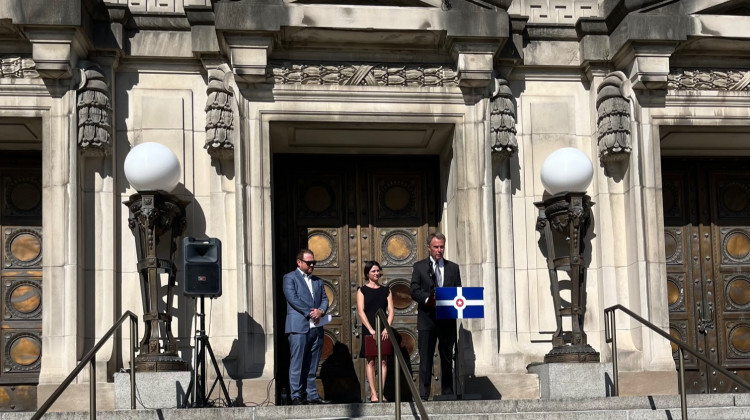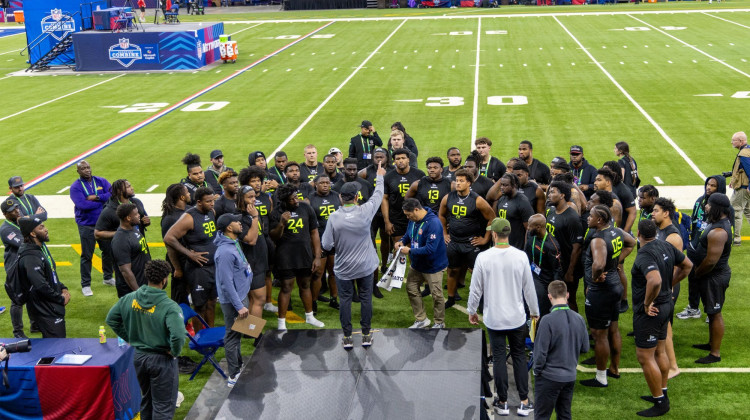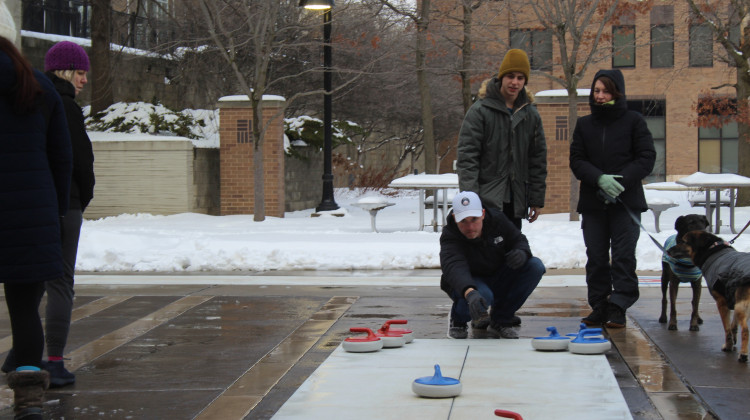
Alyssa Gaines was named the 2022 National Youth Poet Laureate in May and is a recent high school graduate of Park Tudor School in Indianapolis.
National Youth Poet Laureate/Urban WordThis year’s National Youth Poet Laureate is recent Indianapolis high school graduate Alyssa Gaines.
Since third grade, Gaines has participated in the Indianapolis Youth Poet Laureate program through the location organization VOICES. Now as the national youth poet laureate, she will spend the next year leading writing workshops, speaking and performing at cultural events across the country, as well as writing a monthly blog hosted by the Library of Congress. Gaines will attend Harvard University this fall.
WFYI’s Elizabeth Gabriel spoke with Gaines about her experiences as a Black Hoosier and how they have influenced her writing career. The interview was edited for clarity.
Elizabeth Gabriel: How old were you when you started writing, and how did you become so involved with poetry?
Alyssa Gaines: So I started writing poetry with an assignment in my third grade English class, and we all wrote poems about a color. And I think at that time, I was starting to become more aware of the factors that affected how I saw myself and the cultural traditions that I interacted with. And so I chose to write about the color black. Then I took it home, I showed my family of course, and they got super excited about it and my family started taking me to poetry events around the city of Indianapolis. Particularly youth poetry events – readings, open mic, slams – and kind of that way, I got involved with the world of slam poetry. And through that, I started really working and paying attention to the written word. And I've just kept writing ever since.
Gabriel: Nice. And you grew up on the east side of Indianapolis? What was it like growing up as a young Black girl, and how has that impacted your work?
Gaines: All these intersections, I think they all connect and they all really affect my writing because they affect my perspective. And so I talk a lot about healing and grief, and this kind of collective experience of not only trauma, but this collective recovery. And I think that that particularly is something that I learned and took with me from where I grew up, because you hear these news stories, you see people in your community that are, are being killed or that are dying – particularly young people. And then as a community, you're back at school on Monday. As a community you have to move on and you have to grieve and to keep pushing forward. And so I learned a lot from seeing the way that my community did that.
Gabriel: Great. Are there any specific social issues or any there any specific topics that you want addressed either locally in the community or nationally?
Gaines: I'm very interested in community arts in response to change. So the communal arts – arts that involve an audience and a speaker. A performer interacting with the people that they are performing to. So not just, you know, you write a poem and publish it and someone else reads it, but these kinds of community experiences. And the way that these are used in the face of big changes, big events, whether that's gun violence, grief or things like that.
Gabriel: As we talked about in the hall, you recently graduated from Park Tudor School and you're going to be off to Harvard soon. Do you have any advice for aspiring youth poets who want to pursue writing as a career?
Gaines: I think the advice that I always say is just start writing and keep writing. So first and foremost, when you have an idea – when you have something that you're passionate about, or a perspective that you want to share, a story you want to tell – write it down and document that. And then also, I think reading is super important. Good writers are good readers. And so I think I learned a lot when I was really young, watching other slam teams perform and compete and just watching all the Button Poetry videos I could find and reading everything I could find. So not only being a good writer and being dedicated to the story that you have to share, but also being a good reader and a good listener and learning from the people around you.
Gabriel: Nice. And before you go, can you share a little bit about one of your poems?
Gaines: Yeah! I think it's fitting and it's exciting to talk about "Lagrimas Negras" right now because that's the poem I did at the Kennedy Center during the commencement event. That's a poem that combined song, and it's a very particular type of song. It's a Cuban boleto, which are songs that everyone kind of knows. Songs that, if you start singing it, someone else will recognize it immediately – very familiar songs. And it talks about these cultural traditions and things that are preserved and passed down as a way to heal in times of grief. Particularly as a Black woman, as a Black girl, hearing about other Black women being killed or going missing, looking to these traditions that are really rooted in community and healing as a way to protect yourself and to make sure that you are still finding moments of joy in all this sadness and grief.

Applications for the 2023 Indiana Youth Poet Laureate conception are now open. Hoosiers ages 13-19 can apply to become the next YPL by submitting five poems and a resume highlighting their leadership experiences and community engagement to IndyYPL@gmail.com.
Contact WFYI education reporter Elizabeth Gabriel at egabriel@wfyi.org. Follow on Twitter: @_elizabethgabs.
 DONATE
DONATE






 Support WFYI. We can't do it without you.
Support WFYI. We can't do it without you.